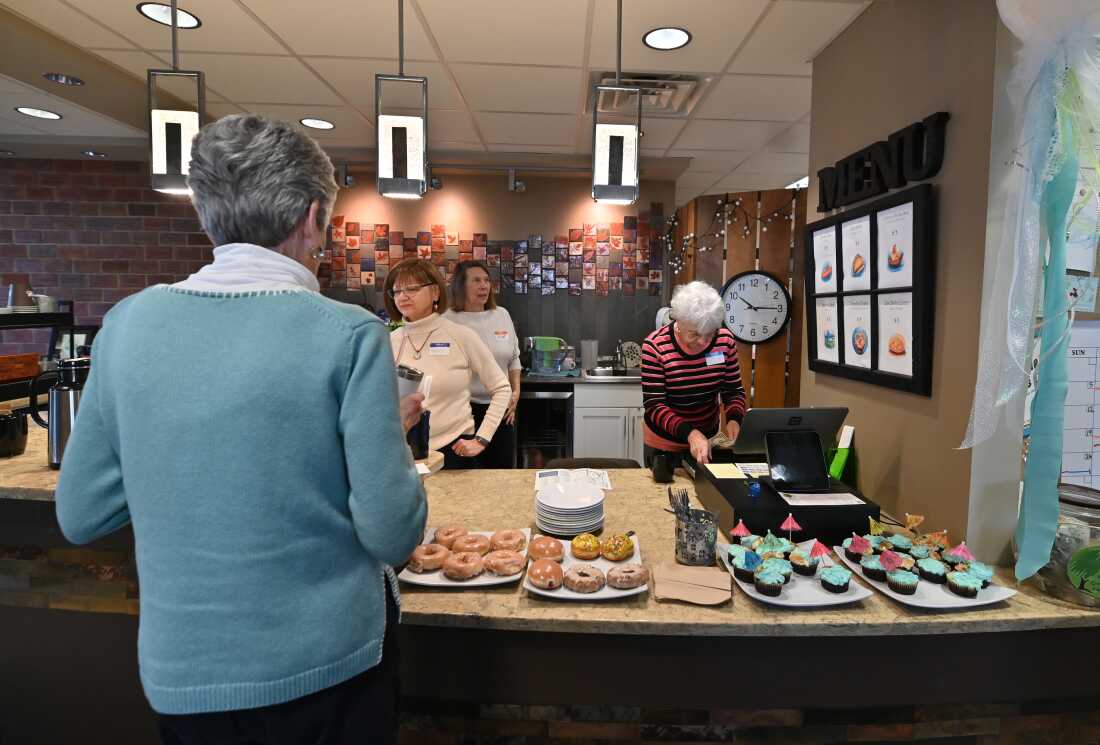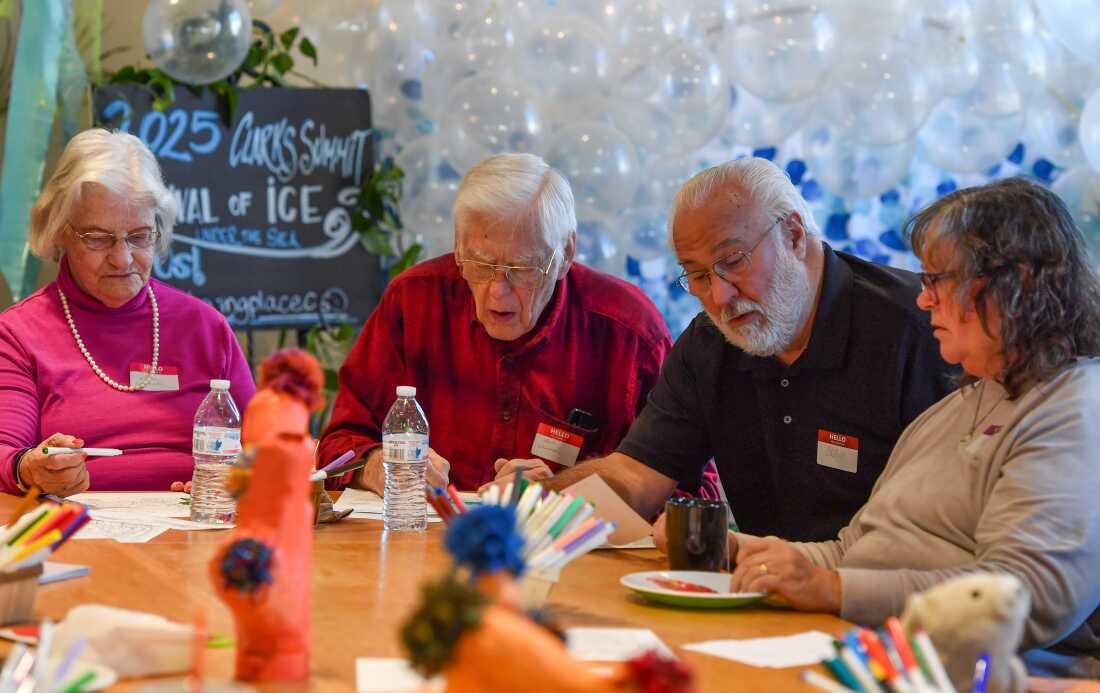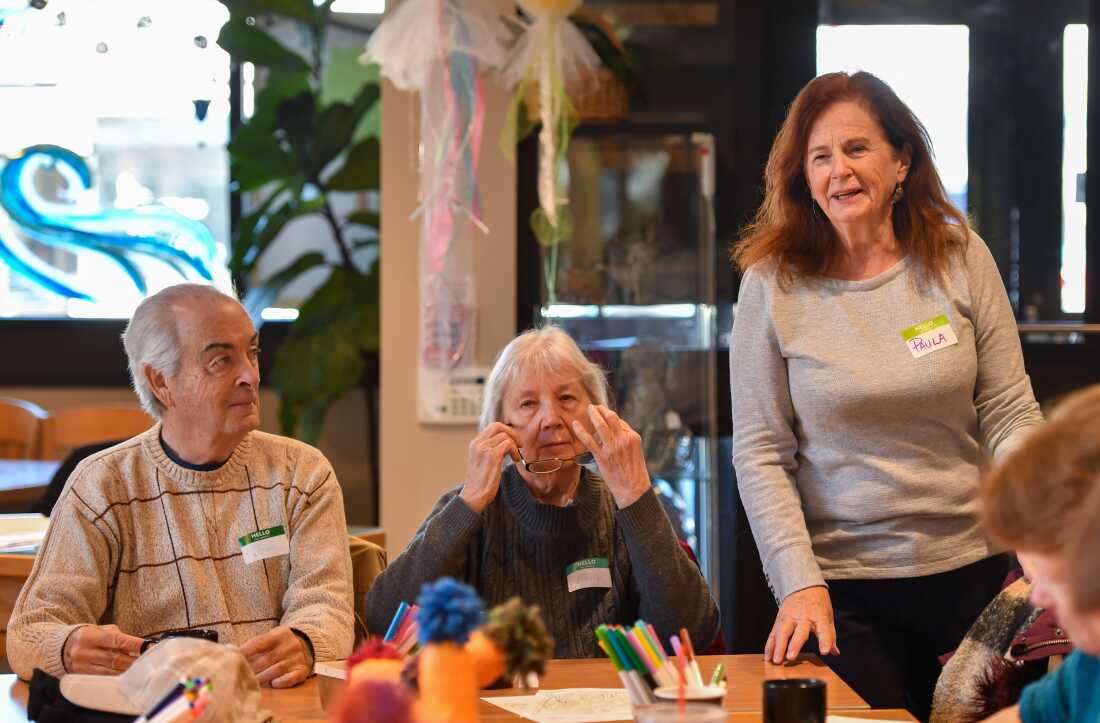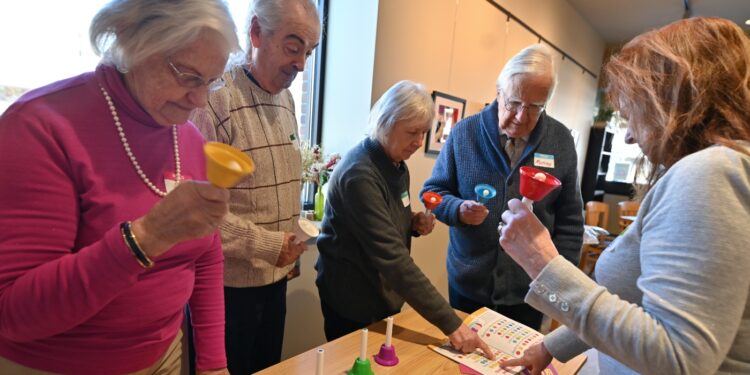
Paula Baille leads the group of Sharon Hannamaker, Joe Edwards, Barb Edwards, and Murray Small in a enjoying of the bells.
Aimee Dilger/WVIA Information
conceal caption
toggle caption
Aimee Dilger/WVIA Information
Rob Kennedy mingled with a few dozen different individuals in a neighborhood area in Clarks Summit, Pennsylvania.
The room, adorned with an under-the-sea theme, had a balloon arch decked out with streamers meant to seem like jellyfish and a cloud of clear balloons mimicking ocean bubbles.
Kennedy involves this reminiscence cafe twice a month since being identified with early onset Alzheimer’s illness in his late 50s.
Everybody right here has a level of reminiscence loss or is a caregiver for somebody with reminiscence loss.
Attendees coloured on worksheets with an underwater theme. They drank espresso and returned to the breakfast bar for seconds on pastries
A fast spherical of trivia will get everybody’s minds working.
“We begin out with simply little trivia, many people can not reply any of the questions,” Kennedy stated with fun.
“All of us have an excellent time going round,” he added. “You understand, all of us attempt to make it enjoyable.”
This reminiscence cafe in northeast Pennsylvania is one in all greater than 600 throughout the nation. These gatherings for individuals with cognitive impairment and their caregivers are comparatively low-cost and simple to run — typically the one expense is a small rental payment for the area.
As state and native well being departments nationwide attempt to make sense of what the potential lack of $11 billion of federal well being funding will imply for the companies they’ll provide their communities, reminiscence cafe organizers consider their work might develop into much more necessary.

As issues get underway on the reminiscence cafe in Clarks Summit, Penn., visitors assist themselves to breakfast pastries.
Aimee Dilger/WVIA Information
conceal caption
toggle caption
Aimee Dilger/WVIA Information
Kennedy’s analysis pressured him to retire, ending a a long time’ lengthy profession as a software program engineer on the College of Scranton.
He recommends reminiscence cafes to different individuals with dementia and their households.
“If they don’t seem to be coming to a spot like this, they’re doing themselves a disservice. You bought to get on the market and see individuals which are laughing.”
The reminiscence cafes occur twice a month. They’ve given him objective, Kennedy stated, and assist him deal with unfavorable feelings round his analysis.
“I got here in and I used to be depressing,” Kennedy stated. “I are available now and it is like, it is household, it is a massive, prolonged household. I get to satisfy them. I get to satisfy their companions. I get to satisfy their kids. So, it is very nice.”
Dropping reminiscence, and different issues too
Greater than six million individuals within the U.S. have been identified with some type of dementia. The analysis could be burdensome on relationships, notably with members of the family who’re the first caregivers.
A brand new report from the Alzheimer’s Affiliation discovered that 70% of caregivers reported that coordinating care is anxious. Socializing may also develop into harder after analysis.
“One factor I’ve heard many times from individuals who come to our Reminiscence Cafe is ‘all of our buddies disappeared,'” stated Beth Soltzberg, a social employee at Jewish Household and Youngsters’s service of Larger Boston, the place she directs the Alzheimer’s and associated dementia household assist program.
The inclusion of caregivers is what distinguishes reminiscence cafes from different applications that serve individuals with cognitive impairment, like grownup day care. Reminiscence cafes do not provide formal therapies or assist. At a reminiscence cafe, having enjoyable collectively and being social is the assist. And that assist is for the affected person and their caregiver — as a result of each can endure from social isolation and misery after a analysis.
A 2021 examine from Frontiers in Public Well being indicated that even on-line reminiscence cafes throughout the pandemic offered social assist for each sufferers and their members of the family.
“A Reminiscence Cafe is a restaurant which acknowledges that a number of the shoppers right here might have cognitive impairment, some might not,” stated Jason Karlawish, a geriatrics professor on the College of Pennsylvania’s Perelman Faculty of Drugs and the co-director of the Penn Reminiscence Middle.
Karlawish usually recommends reminiscence cafes to his sufferers, partly as a result of they profit the caregivers as nicely.
“The caregiver-patient dyad, I discover typically, has achieved some extent of connection and delight in doing issues collectively,” Karlawish stated. “For a lot of, that is a really gratifying expertise, as a result of dementia does reshape relationships.”
“That socialization actually does assist ease the stress that they really feel from being a caregiver,” stated Kyra O’Brien, a neurologist who additionally teaches at Penn’s Perelman Faculty of Drugs. “We all know that sufferers have higher high quality of life when their caregivers are below much less stress.”

Friends on the Gathering Place Reminiscence meet up assist eachother to learn a trivia query.
AIMEE DILGER/WVIA Information
conceal caption
toggle caption
AIMEE DILGER/WVIA Information
Because the inhabitants grows older, the variety of out there household caregivers is lowering, in keeping with the AARP’s Public Coverage Institute. The report discovered that the variety of potential caregivers for a person 80 or older will lower considerably by 2050.
In 2024, the Alzheimer’s Affiliation issued a report projecting a leap in dementia instances within the U.S. from an estimated 6.9 million individuals presently dwelling with Alzheimer’s dementia to 13.8 million individuals by 2060. It attributed this improve primarily to the growing old of the newborn increase technology, or these born between 1946 and 1964.
An inexpensive option to deal with a rising drawback
As instances of reminiscence loss are anticipated to rise, the Trump administration is making an attempt to chop billions in well being spending. Since reminiscence cafes do not depend on federal {dollars}, they could develop into an much more necessary a part of the continuum of look after individuals with reminiscence loss and their family members.
“We’re combating off some fairly important Medicaid cuts on the Congressional stage,” stated Georgia Goodman, director of Medicare coverage for Main Age, a nationwide nonprofit community of growing old companies.
Though Medicaid does not essentially pay for reminiscence cafes, they’ll play a component in long-term care, Goodman defined.

Actions on the reminiscence cafe embody trivia, crafting, coloring and enjoying songs on the bells.
AIMEE DILGER/WVIA Information
conceal caption
toggle caption
AIMEE DILGER/WVIA Information
The nonprofit Reminiscence Lane Care Providers operates two reminiscence cafes in Toledo, Ohio. They’re nearly free to function, as a result of they happen in venues that do not require cost, in keeping with Salli Bollin, the chief director.
“That basically helps from a value standpoint, from a funding standpoint,” Bollin stated.
One of many reminiscence cafes takes place as soon as a month at a neighborhood espresso store. The opposite meets on the Toledo Museum of Artwork. Reminiscence Lane Care Providers gives the museum staff with coaching in dementia sensitivity to allow them to lead excursions for the reminiscence cafe individuals.
The reminiscence cafe that Rob Kennedy attends in Northeast Pennsylvania prices about $150 a month to run, in keeping with the host group, The Gathering Place..
“This can be a labor of affection,” stated board member Paula Baillie, referring to the volunteers who run the reminiscence cafe. “The truth that they’re giving up time – they acknowledge that that is necessary.” Baillie stated.
The month-to-month funds goes to crafts, books, espresso, snacks and a few utilities for the two-hour conferences. Native foundations present grants that assist her cowl these prices.

Paula Baille talks with visitors on the Gathering Place in Clarks Summit throughout the Friday reminiscence cafe, whereas Joe and Barb Edwards pay attention.
AIMEE DILGER/WVIA Information
conceal caption
toggle caption
AIMEE DILGER/WVIA Information
Though reminiscence cafes are cheap and never depending on federal funding, they may nonetheless face oblique obstacles on account of the Trump administration’s latest funding cuts.
Organizers fear that lack of federal funds may negatively impression the native establishments the place they happen, akin to libraries and different neighborhood areas.
Wisconsin has develop into a reminiscence cafe hotspot
At the very least 39 states have hosted reminiscence cafes lately, in keeping with Dementia Pleasant America. Wisconsin has probably the most, with greater than 100 reminiscence cafes working within the state.
Wisconsin has a robust infrastructure centered on reminiscence care, which ought to preserve the state’s reminiscence cafes operating regardless of what’s taking place on the federal stage, in keeping with Susan McFadden, a professor emerita of psychology on the College of Wisconsin, Oshkosh. She co-founded the Fox Valley Reminiscence Mission, which oversees 14 reminiscence cafes.
“They’ve operated on the grassroots, they’ve operated on fairly small budgets and a variety of goodwill,” she stated.

A lot of those who attend simply take pleasure in socializing and coloring.
AIMEE DILGER/WVIA Information
conceal caption
toggle caption
AIMEE DILGER/WVIA Information
Since 2013, Wisconsin has additionally had a novel community for dementia care, with state-funded dementia care specialists for every county and federally-recognized tribe in Wisconsin. The specialists assist join people with cognitive impairment to neighborhood assets, bolstering reminiscence cafe attendance.
McFadden first heard about reminiscence cafes in 2011, earlier than they had been widespread in america. She was conducting analysis on reminiscence and educating programs on growing old.
McFadden reached out to reminiscence cafes in the UK, the place the mannequin was already widespread and well-connected. Reminiscence cafe organizers invited her to go to and observe them in individual, so she deliberate a visit abroad together with her husband.
Their tour left out the standard vacationer hotspots, taking them to extra humble settings.
“We noticed church basements and senior heart eating rooms and assisted dwelling eating rooms,” she stated. “That, to me, is absolutely the core of reminiscence cafes,” McFadden added.
“It is hospitality. It is reaching out to individuals you do not know and welcoming them, and that is what they did for us.”
After her journey, McFadden began making use of for grants and scouting areas that might host reminiscence cafes in Wisconsin.
She opened her first one in Appleton, Wisconsin in 2012, simply over a 12 months after her transformative journey to the UK.
Lately, she factors individuals to a nationwide listing of reminiscence cafes hosted by Dementia Pleasant America. The group’s Reminiscence Cafe Alliance additionally provides coaching modules — developed by McFadden and her colleague Anne Basting — to assist individuals begin set up the cafes in their very own communities, wherever they’re within the nation.
“They don’t seem to be so arduous to arrange, they don’t seem to be costly,” McFadden stated. “It does not require an act of the legislature to do a reminiscence cafe. It takes neighborhood engagement.”
This story comes from NPR’s well being reporting partnership with WVIA and KFF Well being Information.








Discussion about this post